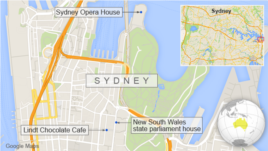Police: 3 Dead, Including Gunman, in Sydney Siege

A daylong standoff in Sydney, Australia, ended after heavily armed police stormed the cafe where a man reportedly held at least a dozen people hostage, leaving two hostages and the gunman dead.
Heavy gunfire and loud bangs from stun grenades filled the air around 2 a.m. local time (1500 GMT on Monday) after security forces in tactical gear surrounded, then entered the storefront.
The police action brought to an end the more than 16-hour drama in Sydney. In addition to the three dead, four people were injured.
Moments before police stormed the cafe, at least six people believed to have been held captive managed to flee.
A 50-year-old man, a 38-year-old woman and a 34-year-old man had died, New South Wales police said.
Two people were taken to hospital with non-life-threatening injuries, while a police officer was being treated after being hit in the face with gunshot pellets. A woman was also being treated for a gunshot wound to the shoulder, police added.
Identity of gunman
Only minutes before the dramatic end, officials had identified the gunman as Man Haron Monis, an Iranian refugee and a self-proclaimed Muslim cleric.
Monis is believed to have started the siege on the Lindt chocolate cafe in the city’s central business district about 9:45 a.m. local time Monday.
Monis, who is facing charges including sexual assault and accessory to murder in separate cases, was found guilty in 2012 of sending offensive and threatening letters to the families of Australian soldiers killed overseas, according to media reports.
Media said that two people, including the gunman, had been killed. New South Wales police declined to comment on the reports, and it was not clear whether the fatalities occurred during the rescue operation itself.
Local media reported that Monis, who was known as Manteghi Bourjerdi before he changed his name, was 49 or 50 years old.
Early in the crisis, hostages were seen standing with their hands pushed up against the windows. A black flag with the Islamic creed known as the Shahada written in white could be seen through the glass.
New South Police Commissioner Andrew Scipione on Monday refused to call the situation a terrorist act. But Prime Minister Tony Abbott said the incident at the cafe may have been politically motivated.
Nearby buildings, including the U.S. Consulate in Sydney, had been evacuated. U.S. State Department spokeswoman Jen Psaki said the department is monitoring the hostage situation and the mission’s personnel are accounted for.
The New South Wales state parliament house is also just a few blocks away.
Security experts
Although Monis was well known to authorities, security experts said preventing attacks by people acting alone could still be difficult.
«Today’s crisis throws into sharp relief the dangers of lone wolf terrorism,» said Cornell University law professor Jens David Ohlin, speaking in New York.
«There are two areas of concern. The first is ISIS (Islamic State) fighters with foreign passports who return to their home countries to commit acts of terrorism,» Ohlin said. «The second is ISIS sympathizers radicalized on the internet who take it upon themselves to commit terrorist attacks to fulfill their radical ideology.
“We are entering a new phase of terrorism that is far more dangerous, and more difficult to defeat, than al-Qaida ever was,» Ohlin said.
Australia, a staunch ally of the United States and its escalating action against the Islamic State group in Syria and Iraq, earlier this year raised its domestic terror threat level from medium to high, mainly due to concerns about home-grown extremists.
About 70 Australians are thought to be fighting for militant groups in the Middle East.
In September, Australia’s largest counterterror raids took place in Sydney and Brisbane. One person was charged with terror offenses.
Tough anti-terror laws were passed by the Australian parliament in October in response to the threat of homegrown extremism.
Phil Mercer contributed to this report from Sydney. Some material for this report came from Reuters, AFP and AP.


